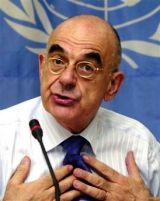UN urges Darfur foes not to export conflict into Chad
Feb 4, 2006 (ABUJA) — The United Nations urged the warring parties from Sudan’s Darfur region on Saturday to stop the conflict from spreading into neighbouring Chad, which has 200,000 Darfur refugees on its territory.
 The top U.N. envoy in Sudan, Jan Pronk, also rebuked the parties for escalating fighting in Darfur, to the detriment of peace talks in the Nigerian capital Abuja between the Sudanese government and two rebel movements.
The top U.N. envoy in Sudan, Jan Pronk, also rebuked the parties for escalating fighting in Darfur, to the detriment of peace talks in the Nigerian capital Abuja between the Sudanese government and two rebel movements.
“You say there is some progress here, but there is regression on the ground. You must close the credibility gap between Abuja and Darfur,” Pronk told the negotiators during a visit to Abuja, where the talks are in their seventh round.
The African Union (AU), which has 7,000 peacekeepers in Darfur and is mediating the talks, says it is hopeful this round will yield a peace deal on the key areas of power-sharing, wealth-sharing and security. But the AU also accuses the parties of talking peace and waging war at the same time.
Pronk described an increasingly chaotic situation in Darfur, where rival rebel factions, bandits, pro-government militias and unidentified gunmen kill, rape and loot with impunity.
He challenged those negotiating in Nigeria to show they had some degree of control in the field by quelling the violence.
Two rebel movements, the Sudan Liberation Army (SLA) and the smaller Justice and Equality Movement (JEM), took up arms in early 2003 over what they see as marginalisation by Khartoum.
The government backed proxy militias to fight the rebels, and the conflict killed tens of thousands of people and drove more than two million from their homes into refugee camps inside Darfur and in Chad.
BEYOND SUDAN’S BORDERS
In a clear reference to a flare-up of tension between Sudan and Chad that has compounded the chaos and violence in western Darfur, Pronk said he was concerned about the “internationalisation of the Darfur conflict”.
“Don’t make alliances with rebel movements in neighbouring countries. Abstain from receiving arms and troops from neighbouring countries,” he urged the parties.
Chadian army deserters and other dissidents bent on toppling President Idriss Deby attacked the Chadian border town of Adre in December. Deby said the attack came from Sudanese territory and accused Khartoum of backing the Chadian rebels — a charge denied by the Sudanese government.
Since then, a new alliance between the JEM and one of the factions of the SLA has raised concern that an ethnically-based coalition is emerging in which Darfur rebels from the same tribe as Deby are siding with him, thus getting involved in Chad.
The SLA is split, with Minni Arcua Minnawi and Abdel Wahed Mohammed al-Nur both claiming leadership of the group. Minni is from the Zaghawa ethnic group — the same as the Chadian president — while Abdel Wahed is Fur.
The Minni faction of the SLA and the JEM, whose leader Khalil Ibrahim is also Zaghawa, announced on Jan. 20 they were merging. Some in the Abdel Wahed faction and other observers have interpreted this as a tribal alliance, although the groups involved say that is not the case.
At the same time, many of the Sudanese rebels are convinced that Khartoum is backing Chadian rebels to oust Deby, despite the government’s repeated denials.
Some delegates in Abuja accuse Khartoum of exporting the Janjaweed militias that have fought in Darfur into Chadian territory.
(Reuters)
